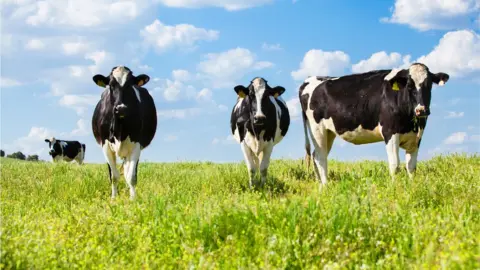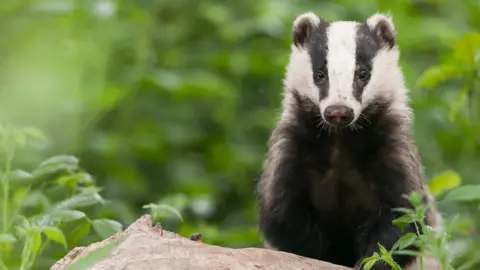Farming: Bovine TB compensation 'unsustainable'
 Getty Images
Getty ImagesThe cost to taxpayers of dealing with cases of bovine TB is "unsustainable", the rural affairs minister has said.
About £14.5m in compensation was paid to farmers in 2018-2019.
Figures showed 11,233 cattle were slaughtered in 2018, a 12% rise on 2017, but there was a 5% fall in new incidents of the disease being found in previously unaffected herds.
Lesley Griffiths said it showed the refreshed TB eradication scheme, which started in 2017, was making progress.
But farming unions urged her to change tack and introduce a badger cull to combat the problem.
Ms Griffiths claimed the sharp increase in numbers of animals being killed was due to heightened surveillance.
She announced a review into the compensation regime would be carried out "at an appropriate time", aimed at promoting "good farming practice while discouraging bad practice".
The latest payouts have risen from £11.7m in 2017-18. In 2016-2017, it was £10.9m.
 Getty Images
Getty ImagesHow is the Welsh Government tackling TB?
The latest approach split the country into different regions, based on the severity of the problem.
The aim is to keep the disease out of the low-risk area of north-west Wales, while eradicating it from high-risk parts of the country like the south-west and along the border.
Farms with a long history of persistent TB issues are issued with tailored action plans, with a handful allowed to trap, test and kill badgers if they are shown to be a contributing factor.
A widespread badger cull, as is happening in parts of England, has been ruled out in Wales.
Meanwhile, a fresh badger vaccination programme has been proposed on the Gower peninsula.
A trial in north Pembrokeshire was halted in 2015 following a global shortage of the TB jab.
Ms Griffiths said officials were also looking at ways to reduce the instances where infected cattle needed to be shot on the farm, in order to make the situation less distressing for farmers and a centre of excellence for TB research has been set up at Aberystwyth University.
Ms Griffiths urged farmers and wildlife groups to work with the government, adding: "By working together in partnership, with a single purpose, we will stamp out this disease."
What do the latest figures show?
In 2018, there were 746 new "herd incidents" - cases of TB in herds that were previously clear of the disease - a 5% decrease on 2017.
While efforts to prevent TB from entering the low-risk area of north-west Wales were judged to have been "successful", 34 new herd incidents were identified.
The government said eight out of 10 of these were put down to infected cattle being moved into the area, despite farms being obliged to carry out both pre and post-movement testing.
Aled Jones, deputy president of NFU Cymru, said it was inappropriate to have a review of the compensation until there was a rapid reduction in the disease.
"The farmers of Wales would far prefer to have 11,233 animals alive and well on their farm - they do not want to see the disease there. Let's also remember the emotional cost this is having."
The Conservatives' rural affairs spokesman Andrew RT Davies said: "Labour's current approach is expensive, erratic and fails to give farmers and the livestock sector confidence that this disease will be eradicated in Wales.
"A lasting solution is long overdue."
